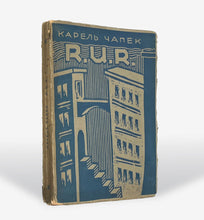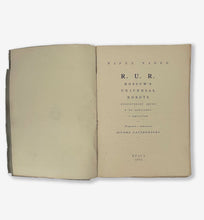Introducing robots into the Soviet Union
ČAPEK, Karel; Joseph KALLINIKOV (translator). R.U.R. [Rossum’s Universal Robots]. Prague: Plamja. 1924.
8vo. Original grey wrappers printed in blue, modernist cover design most likely by Čapek, blue lettering to spine and rear wrapper; pp. xvi, 219, [1 (blank)], untrimmed; a few small nicks to edges, spine ends a little worn with tiny losses, short tears to hinges, internally very good.
One of the first two editions in Russian, very rare, of Karel Čapek’s R.U.R. (Rossum’s Universal Robots), the play that introduced the word “robot” to the world, and a cornerstone of dystopian literature.
First published in the original Czech in 1920, R.U.R. premiered on 2 January 1921 in Hradec Králové, quickly gaining popularity throughout Europe and North America and stimulating the growth of science fiction as a genre. In Russia, this literary trend was marked by Aleksei Tolstoy’s Aelita (1923) and Yevgeny Zamyatin’s We (1924). Zamyatin’s novel, a foundational text of dystopian literature, predicted the oppressive transformations of Russia under Stalin, and became the first novel banned by Soviet censorship. Čapek’s works were treated differently in the USSR: later texts like War with the Newts (1936) and The White Disease (1937) were celebrated for their antifascist themes, while R.U.R. narrowly avoided censorship by being framed as a critique of capitalism.
In 1924, two Russian translations of R.U.R. appeared in Prague and Leningrad. Joseph Kallinikov’s Prague edition stayed faithful to the original Czech text, retaining the title and the neologism “robot”. By contrast, Isai Mandelstam and Yevgeny Gerken’s Leningrad edition, based on a German translation, altered the title to V.U.R. and replaced “robot” with “rabotar’ ” a term adapted to Russian linguistic norms but which ultimately failed to gain acceptance. This variety of translations and terminology delayed the integration of “robot” into the Russian language. Performances of R.U.R. began in 1924, receiving widespread acclaim. Maxim Gorky praised it enthusiastically, while Anatoly Lunacharsky admired its sharp satirical and tragicomic elements.
Through its themes of technological dominance and societal transformation, R.U.R. struck a chord with the Soviet audience. While early Soviet critics had to mask its critique of totalitarianism, this aspect was acknowledged decades later. The play’s exploration of humanity’s relationship with machines introduced profound questions that remain relevant, solidifying its legacy as a pioneering work of dystopian fiction.
This translation has an introduction by František Kubka. Several cover designs by Čapek are available online at The Met: Watson Library Digital Collections.
See Feletto, “Come I robot arrivarono in Unione Sovietica”, Andergraund online.
#2121309




